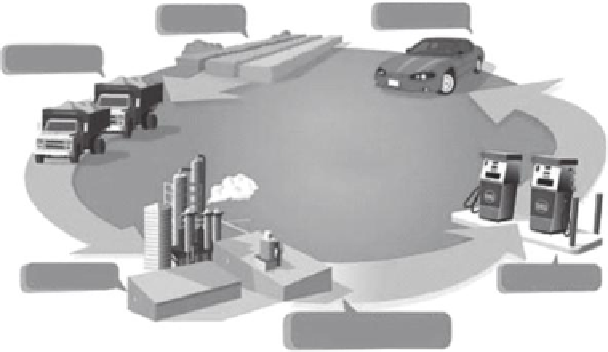Environmental Engineering Reference
In-Depth Information
TABLE 28.5
Summary of Biofuel and Conventional Fuel Water Consumption
Gallons Water Consumed
per Gallon Fuel Produced
Fuel
Corn ethanol with irrigation
a
1000
Soy ethanol with irrigation
650
Cellulosic ethanol with irrigation
2-6
Conventional oil reining
1.5
Natural gas reining
4
a
Reining without irrigation requires 4-6 gal of water per gallon fuel
produced.
28.3.1 Water Use for Bio-Fuels
In a 2009 USGAO report [13], it was discussed that the production process for biofuels
relies heavily on water use. As shown in Figure 28.8 [23], there are several points of water
use and consumption in the biofuel life cycle. Speciically, water is used in cultivation
of feedstock, fermentation, distillation, and cooling/inishing processes for biofuel gen-
eration. Depending on the speciic type of biofuel produced, water needs can vary sig-
niicantly. Furthermore, cultivation and irrigation of the feedstock can also be carried out
through the natural water cycle by using rain-fed crops to mitigate direct use of surface or
groundwater resources [13]. In this case, crops can still affect the water cycle by convert-
ing an area's precipitation to crop evapotranspiration (Figure 28.1) instead of runoff or
groundwater recharge [24]. In addition, the growth of biomass for biofuels requires arable
land, which has only increased globally by 9% during the last 50 years. Signiicant arable
land development is questionable as it competes with either human interests and growing
population or areas of biodiversity and natural ecosystems (such as carbon storage in the
rainforest) [25].
End user
Feedstock
Transportation
Biofuels
life cycle
Biorefinery
Distribution
Processing and
conversion
FIGURE 28.8
Essential steps for water consumption in the biofuel production cycle. The largest consumption occurs at the
processing and reining stages. (Figure originally generated by USDOE and reproduced from USGAO.
Energy-
Water Nexus: Coordinated Federal Approach Needed to Better Manage Energy and Water Trade-offs
. US Government
Accountability Ofice, 2012.)



